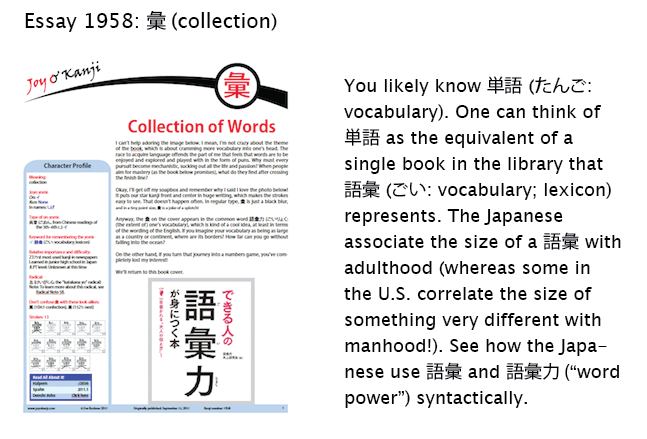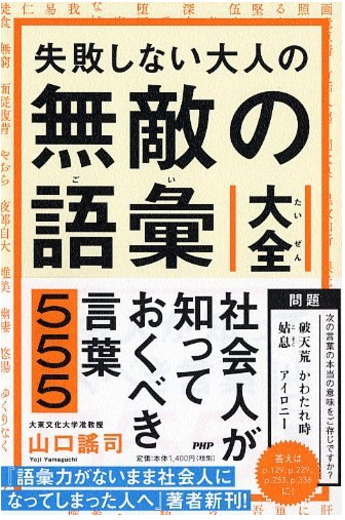Make No Mistake
Essay 1958 on 彙 (collection) is now out, and although I focused the essay on that kanji (of course!), I felt intrigued by several other words I encountered along the way.
For instance, check out this title, which showcases 語彙 (ごい: vocabulary; lexicon):
「失敗しない大人の無敵の語彙大全」
______ of Vocabulary for Adults Who Make No Mistakes
失敗 (しっぱい: mistake); 大人* (おとな: adult)
What do you think the two blue compounds could mean? Choose one option for each:
1. 無敵 (むてき) no + enemy
a. nonaggressive, unthreatening
b. undefensive
c. peaceful, harmonious
d. unrivaled
2. 大全 (たいぜん) big + all; perfect
a. complete perfection
b. encyclopedia
c. showoff, know-it-all
d. maturity
I'll block the answers with a sneak preview of the new essay.
Okay, here we go.
1.d. 無敵 (むてき: no + enemy) means "unrivaled." In looking at 敵 compounds in Halpern, I realized for the first time that 素敵 (すてき: lovely; great) includes a kanji meaning "enemy"! How did I miss that before? The word is ateji, so the meanings of each character don't matter here. But still!
2.b. 大全 (たいぜん: big + all) means "encyclopedia."
Thus, the title translation is as follows:
「失敗しない大人の無敵の語彙大全」
Unrivaled Encyclopedia of Vocabulary for Adults Who Make No Mistakes
失敗 (しっぱい: mistake); 大人 (おとな: adult); 無敵 (むてき: unrivaled); 大全 (たいぜん: encyclopedia)
Here's the cover of that book:
Notice the furigana. The assumption seems to be that the target market has such a small vocabulary that they can't read certain words! The book is for adults who have a limited vocabulary but don’t want to make mistakes by choosing the wrong word for the situation. Given that, the title is misleading. It sounds like it's for people who are already perfect and hardly need such a book!
The subtitle of that work contains another sumptuous term:
「社会人が知っておくべき言葉555」
55 Words You Should Know to Be a ________
知る (しる: to know); -ておく (to do in preparation); -べき (should); 言葉 (ことば: word)
What do you think the blue term could mean? Here's the breakdown and your choices:
社会人 (しゃかいじん) society (1st 2 kanji) + person
a. high-society person who moves among the rich and powerful
b. considerate, unselfish person
c. full-fledged member of society
d. social butterfly
I'll block the answer with another book cover from the same essay:
c. 社会人 (しゃかいじん: society (1st 2 kanji) + person) means "full-fledged member of society." And now I'm seeing "fledged" with fresh eyes. "Full-fledged" means "fully developed," referring to a bird that has acquired adult feathers and can therefore fly! The opposite is a "fledgling," a young bird lacking fully developed feathers. Very cool!
Anyway, here's the translated subtitle of that book:
「社会人が知っておくべき言葉555」
555 Words You Should Know to Be a Full-Fledged Member of Society
社会人 (しゃかいじん: full-fledged member of society); 知る (しる: to know); -ておく (to do in preparation); -べき (should); 言葉 (ことば: word)
Now take a look at the white book cover just above. This title taught me a new word. I don't mean 語彙力 (ごいりょく: (the extent of) one’s vocabulary) but rather this term:
できる人 (できるひと: competent person)
A competent person is a person (人) who can (できる) do things!
The subtitle really threw me for a loop:
「一目置かれる“大人の伝え方”!」
How Adults Convey What They Want to Say and Earn Respect
一目置く (いちもくおく: to acknowledge someone’s superiority and show respect, shown here in its passive voice); 伝え方 (つたえかた: how to convey)
I had taken the first bit as 一目 (いちもく: look, glance), never dreaming that 一目置 had a connection to the game of Go. In the context of that game, -目 is a counter for grids on a game board. With 一目置く (いちもくおく) the idea is that if you know beforehand that you are facing a superior opponent, you can place a stone on the board to level the playing field. (The one with more stones on the board at the end wins.) This a way of showing respect and acknowledging the other person's superiority. And that practice gave rise to 一目置く with the figurative meaning you see above.
We're back to the idea of opponents, but it feels as if we've come a long way from 無敵!
❖❖❖
Did you like this post? Express your love by supporting Joy o' Kanji on Patreon:





Comments